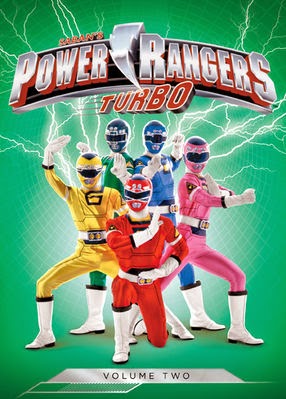Favourite Ranger: Tanya Sloan, The Yellow Turbo Ranger I
Favourite Villain: Divatox
Favourite Episode: "Chase Into Space," Parts I & II
Least Favourite Ranger: Justin Stewart, The Blue Turbo Ranger
Least Favourite Villain: Crash & The Creeps
Least Favourite Episode: "Trouble by the Slice"
After the fall of the Machine Empire, space pirate Divatox sets her sights on Earth. There's just one problem - the would-be conquerer must contend with the super-powered teen heroes known as the Power Rangers.
With the assistance of their new mentor Dimitria and a brand-new set of powers, these rainbow-coloured heroes are more than ready to take on Divatox.
Immediately proceeding the events of Turbo: A Power Rangers Movie, this season sees pre-teen Ranger Justin settling into his new role as a superhero and the villainous Divatox regrouping after her humiliating defeat at the hands of the Power Rangers.
From the onset, there is a notable shift in the tone of the series and it's clear that the producers were looking to cater to younger audiences once more. Unfortunately, this creates a problem as it gives the overall narrative a regressive quality.
Having matured over the course of the past four seasons, Bulk and Skull are returned to the role of bumbling idiots. First, through a subplot where they are turned into chimps and then through a recurring gag about their inability to hold onto a job for more than one episode.
The inclusion of Justin as a Power Ranger is equally as problematic. Though he may be mature for his age, the dynamic he creates throws off the balance amongst the team. He's shoehorned into just about every story, which means that it becomes increasingly more difficult for the writers to provide more sophisticated storytelling. This means that we see a lot of oddly themed episodes, such as one where the Rangers are shrunk and another where they're essentially baked into a giant pizza.
In many ways, Turbo represents a major shift in the Power Rangers franchise. Old characters are written off, while an onslaught of new ones are seemingly introduced in every other episode. Sadly, this isn't always for the better.
Zordon and Alpha 5 are immediately replaced by Dimitria and Alpha 6, the latter being incredibly irritating due to the odd voice work and dated slang. Mainstays Tommy, Kat, Adam and Tanya are also written out midway through the season, bringing in a crop of younger and less experienced Rangers into the fray.
This near-complete makeover of the Rangers is quite unfortunate since the new batch of actors they hired are nowhere near as good as the old guard. Patricia Ja Lee is particularly difficult to watch at times, as she appears to phone in most of her performances using gestures you'd expect from elementary school kids.
That said, there's still a lot of untapped potential among the new Rangers. Ashley, the new Yellow Ranger, had the opportunity to be the second coming of Kimberly due to their similar personalities and interests. However, she was swiftly relegated to the background in favour of highlighting Cassie and the boys.
Despite the steep drop in the quality of the series, Turbo isn't all bad. In fact, it would be easy to argue that the season isn't really about the Rangers at all and that the true star is Divatox. This scene-stealing villain outshines just about every bad guy that preceded her and her zany antics create the most memorable moments from the season. This is a true testament to the combined talents of Carol Hoyt and Hilary Shepard, whose turns as the campy femme fatale helped make the season watchable.
What is so disappointing about Power Rangers Turbo isn't how formulaic it is or how poor the acting can be, but rather how much squandered potential there was. The costuming was great, the automotive theme was clear and the producers had a fantastic villain at their disposal, yet they opted to focus most of their energies on disposable filler episodes, introducing new characters and developing the nearly universally despised Blue Turbo Ranger more than the others. Obviously not every season of Power Rangers is going to be great, but the tragedy with Turbo was that it could have been so much better.











